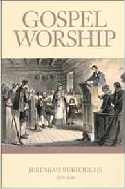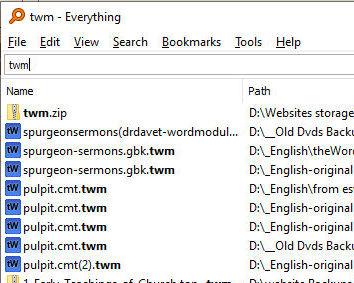Everett, Gary – Study Notes on the Holy Scriptures (64 vols)
Taken from wordmodules.com (download the twm module from this page)
Get the Big (and Microscopic) Picture
Gary H. Everett’s 2013 edition of Study Notes on the Holy Scriptures is a culmination of thirty-two years of personal Bible study, resulting in 10,000+ pages of text and 50 megabytes of data. This commentary is theologically conservative in many ways, yet charismatic (i.e. gifts of the Spirit, speaking in tongues, etc.).
How This Commentary Works
Study Notes first identifies the major themes in passages, progressively tightening the scope until individual verses are examined. This is critical for context.
Helpful for Christians
The themes of each book of the Holy Bible can be established, and they are generally found within the first few verses of each book. (For example, the ancient Jews entitled many of their Old Testament books upon this principle as they took either the first Hebrew word or the most important word in the opening passage of each book for its title.) Each title reflected the theme of that book. In addition, the books of the Bible often close with a summary statement that again reflects the theme of the book.
This way, the reader can follow the redemptive structure of the Holy Bible, so that a person knows what a passage of Scripture is saying in respect to the overall theme, or message, of that particular book.

Burroughs Gospel Worship 14 chapters (263 pages) which are each a sermon on how to properly worship God. (format PDF)
“Jeremiah Burroughs’ Gospel Worship has greatly influenced my understanding of biblical worship. It is one of the most important books I have ever read.”
–R.C. Sproul
Download: Burroughs Gospel Worship.
Amazingly, as one identifies the themes of each book of the Bible and compares these themes to one another, it becomes clear that they are intricately woven into a harmonious unity that defies man’s ability to have intentionally designed it that way. We are left to conclude that the themes and arrangements of these books were orchestrated by God Himself guiding man over the sixteen hundred years of its writing and composition using approximately forty authors of different nationalities
Helpful for Preachers
Without some type of systematic approach that identifies the literary structure, the expository preacher easily becomes lost while developing sermon series and preaching through a book of the Bible, causing the sermons to be disjointed because individual messages fail to support and develop the primary theological movement of the book. Without a clear, homiletical focus from the preacher, the congregation struggles to understand the importance of the sermon series; and thus, it fails to embrace the book’s overarching message. The goal of the expository preacher is to take his congregation on a spiritual journey through a book of the Bible, a journey with a clear destination that is continually echoed throughout a series of connected messages, a necessary journey if the preacher intends to transform the congregation into the image of the Lord Jesus Christ week by week, sermon by sermon.
An individual sermon text must hinge upon the bigger picture surrounding its context, a picture that encompasses the literary structure and thematic scheme of the entire book of the Holy Scripture, including the theme of the major division of the Bible in which the book has been divinely placed, with everything centered upon the primary, Christocentric framework of the Holy Scriptures themselves. In order to accomplish this task, the preacher must have a systematic method specifically designed for one of the most difficult tasks of the pulpit ministry. Study Notes on the Holy Scriptures is designed to offer a systematic method of biblical exegesis.
Higher Criticism
While various forms of higher criticism have embedded themselves is the last two centuries of commentaries, recent trends is biblical scholarship favor the approach of the books of the Holy Bible as individual literary works. Each book deserves to be recognized in the form in which it has been handed to the Church. Therefore, Everett places a lot of weight upon the witnesses of the early Church fathers while largely ignoring the negative arguments of modern higher criticism. Such discussions are not profitable for helping to determine the themes and interpretations of each book. This criticism confuses rather than clarifies the theme, and it wearies rather than edifies the reader. In addition, such critics rely upon speculation rather than material witnesses, harshly attacking the valid testimony that does exist and has stood for seventeen centuries before the era of modern higher criticism.
Copyright
© Gary H. Everett, 1981-2013
All rights reserved. No part of this work may be reproduced, stored, or transmitted in any form without prior permission of the author.
Used by BibleSupport.com with permission. This commentary can be purchased from Logos.
All Scripture quotations in English are taken from the King James Version unless otherwise noted. Some words have been emphasized by the author of this commentary using bold or italics.
All Old Testament Scripture quotations in the Hebrew text are taken from Biblia Hebraica Stuttgartensia: With Westminster Hebrew Morphology, electronic ed., Stuttgart; Glenside PA: German Bible Society, Westminster Seminary, 1996, c1925, morphology c1991, in Libronix Digital Library System, v. 2.1c [CD-ROM] Bellingham, WA: Libronix Corp., 2000-2004.
All New Testament Scripture quotations in the Greek text are taken from Greek New Testament, Fourth Revised Edition (with Morphology), eds. Kurt Aland, Matthew Black, Carlo M. Martini, Bruce M. Metzger, M. Robinson, and Allen Wikgren, Stuttgart: Deutsche Bibelgesellschaft (United Bible Societies), c1966, 1993, 2006, in Libronix Digital Library System, v. 2.1c [CD-ROM] Bellingham, WA: Libronix Corp., 2000-2004.
All Hebrew and Greek text for word studies are taken from James Strong in The New Strong’s Dictionary of Hebrew and Greek Words, Nashville: Thomas Nelson, c1996, 1997, in Libronix Digital Library System, v. 2.1c [CD-ROM] Bellingham, WA: Libronix Corp., 2000-2004.
The Crucifixion image on the book cover was created by the author’s daughter Victoria Everett in 2012.
Statement of Faith
Gary Everett’s complete statement of faith is here. Everett believes in:
- Plenary, verbal inspiration of Scriptures, that the original autographs were without error.
- Triune God
- Unlimited atonement, that Jesus Christ died for all who would accept him.
- Salvation through faith in Jesus Christ alone through God’s grace
- Dispensational theology, including the second coming of Jesus Christ and the rapture.
- Water baptism as a testimony of one’s salvation
- Baptism of the Holy Spirit, including speaking in tongues.
- Gifts of the Spirit, as experienced by millions worldwide and for hundreds of years.
- Hell for all who rejected Jesus Christ.
About Gary H. Everett
Gary H. Everett received his Master of Divinity degree from Southwestern Baptist Theological Seminary in 1992. He is currently pursuing his Doctor of Ministry degree at this same seminary. He has taught in Bible colleges for ten years and served as a pastor for five years.
For thirteen years he has been serving as a missionary in Kampala, Uganda under Dr. Robert B. Nichols of Calvary Cathedral International in Fort Worth, Texas. Gary was married to his wife Menchu in 1996. They have three children, who were all born and raised in Uganda.
Gary is the author of Study Notes on the Holy Scriptures, a large commentary on the Holy Bible, published by Logos Bible Software and also available along with his sermons and teachings on his website www.geverett.org.
Although Everett comes from a Southern Baptist background and attended a Southern Baptist seminary, his eyes were opened to divine healing and the gifts of the Spirit. This would later become critical for his work in Africa. The Holy Spirit seems to play a more prominent role overseas, especially in third-world countries, resulting in mostly charismatic churches. Everett’s understanding of the charismatic movement continues to help his outreach in Uganda.
theWord Edition
This commentary is passage by passage. Although the ad copy for this commentary says it’s over the whole Bible, the bulk of the commentary is for the New Testament. Some Old Testament books are well-commented, like Genesis and the writings of Solomon, while other Old Testament books have a handful of comments per chapter.
Study Notes on the Holy Scriptures – Commentary module
Introduction to the Study Notes – Book module (a great read by itself).
Everett’s writing style produces overlapping comments, some lengthy.
Every Book Comment contains Everett’s thorough Introduction to the book, outline of the book, and complete bibliography.
This commentary is theologically conservative in many ways, yet charismatic (i.e. gifts of the Spirit, speaking in tongues, etc.).
More Modules from this Category
- Expositors Dictionary of Texts
- Nicoll Expositor’s Dictionary of Texts
- Everett, Gary – Study Notes on the Holy Scriptures (64 vols)
- Hastings Dictionary of the NT
Advertisement
 Helpful Windows User Tip for "Searching Everything" on your PC. The Everything Search utility program is a freeware file search utility that is superfast and very useful for finding all occurrences of a file. It takes about 3-6 seconds to start, but after that, every search is just about instantaneous. Very fast, very useful. I highly recommend you download this free PC utility program if you ever have problems finding a file on your PC Computer.
Helpful Windows User Tip for "Searching Everything" on your PC. The Everything Search utility program is a freeware file search utility that is superfast and very useful for finding all occurrences of a file. It takes about 3-6 seconds to start, but after that, every search is just about instantaneous. Very fast, very useful. I highly recommend you download this free PC utility program if you ever have problems finding a file on your PC Computer.
twtutorial.com Helpful Tip "Everything Search".
Note: You can grab and drop files from this tool to other windows.
No Comments
Comments are closed.